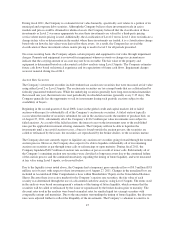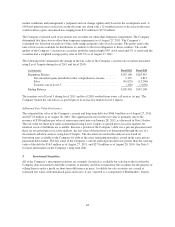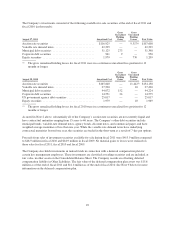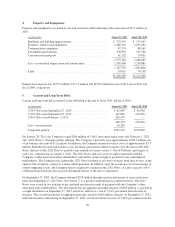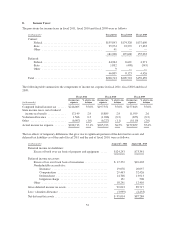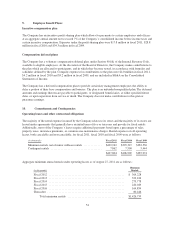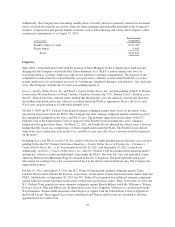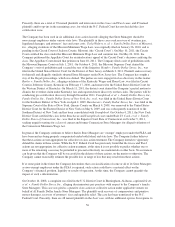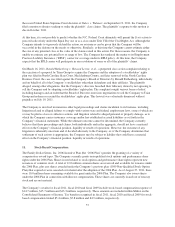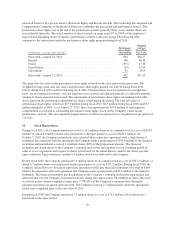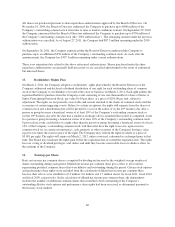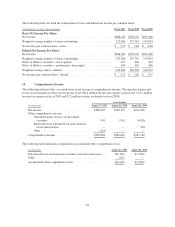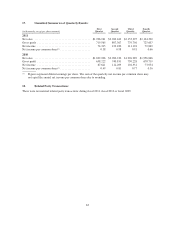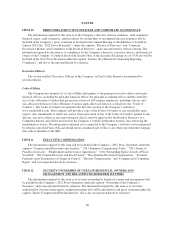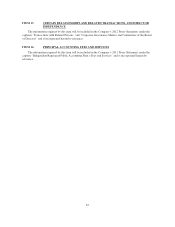Family Dollar 2011 Annual Report Download - page 61
Download and view the complete annual report
Please find page 61 of the 2011 Family Dollar annual report below. You can navigate through the pages in the report by either clicking on the pages listed below, or by using the keyword search tool below to find specific information within the annual report.the recent United States Supreme Court decision of Dukes v. Walmart, on September 19, 2011, the Company
filed a motion to dismiss seeking to strike the plaintiffs’ class claims. The plaintiffs’ response to this motion is
due in October, 2011.
At this time, it is not possible to predict whether the N.C. Federal Court ultimately will permit the Scott action to
proceed collectively under the Equal Pay Act or as a class under Title VII of the Civil Rights Act. Although the
Company intends to vigorously defend the action, no assurances can be given that the Company will be
successful in the defense on the merits or otherwise. Similarly, at this time the Company cannot estimate either
the size of any potential class or the value of the claims raised in this action. For these reasons, the Company is
unable to estimate any potential loss or range of loss. The Company has tendered the matter to its Employment
Practices Liability Insurance (“EPLI”) carrier for coverage under its EPLI policy. At this time, the Company
expects that the EPLI carrier will participate in any resolution of some or all of the plaintiffs’ claims.
On March 16, 2011, Ronald Rothenberg v. Howard Levine, et al,. a purported class action complaint relating to
the rejection of a proposal by Trian Group to acquire the Company and the adoption of a stockholders’ rights
plan was filed in North Carolina State Court, Mecklenburg County, and later removed to the North Carolina
Business Court, the case was filed against the Company’s Board of Directors by Ronald Rothenberg, individually
and on behalf of all of the Company’s stockholders other than defendants and their affiliates. The plaintiffs
alleged, among other allegations, that the Company’s directors breached their fiduciary duties by not agreeing to
sell the Company and by adopting a stockholders’ rights plan. The complaint sought various forms of relief,
including damages and an order that the Board of Directors enter into negotiations to sell the Company to Trian
Group and redeem or rescind the stockholders’ rights plan. This lawsuit was voluntarily dismissed without
prejudice on July 19, 2011.
The Company is involved in numerous other legal proceedings and claims incidental to its business, including
litigation related to alleged failures to comply with various state and federal employment laws, some of which are
or may be pled as class or collective actions, and litigation related to alleged personal or property damage, as to
which the Company carries insurance coverage and/or has established accrued liabilities as set forth in the
Company’s financial statements. While the ultimate outcome cannot be determined, the Company currently
believes that these proceedings and claims, both individually and in the aggregate, should not have a material
effect on the Company’s financial position, liquidity or results of operations. However, the outcome of any
litigation is inherently uncertain and, if decided adversely to the Company, or, if the Company determines that
settlement of such actions is appropriate, the Company may be subject to liability that could have a material
effect on the Company’s financial position, liquidity or results of operations.
11. Stock-Based Compensation:
The Family Dollar Stores, Inc. 2006 Incentive Plan (the “2006 Plan”) permits the granting of a variety of
compensatory award types. The Company currently grants non-qualified stock options and performance share
rights under the 2006 Plan. Shares issued related to stock options and performance share rights represent new
issuances of common stock. A total of 12.0 million common shares are reserved and available for issuance under
the 2006 Plan, plus any shares awarded under the Company’s previous plan (1989 Non-Qualified Stock Option
Plan) that expired or were canceled or forfeited after the adoption of the 2006 Plan. As of August 27, 2011, there
were 10.0 million shares remaining available for grant under the 2006 Plan. The Company also issues shares
under the 2006 Plan in connection with director compensation. These shares are currently issued out of treasury
stock and are not material.
The Company’s results for fiscal 2011, fiscal 2010 and fiscal 2009 include stock-based compensation expense of
$14.7 million, $15.7 million and $13.3 million, respectively. These amounts are included within SG&A on the
Consolidated Statements of Income. Tax benefits recognized in fiscal 2011, fiscal 2010 and fiscal 2009 for stock-
based compensation totaled $5.4 million, $5.8 million and $4.9 million, respectively.
57


